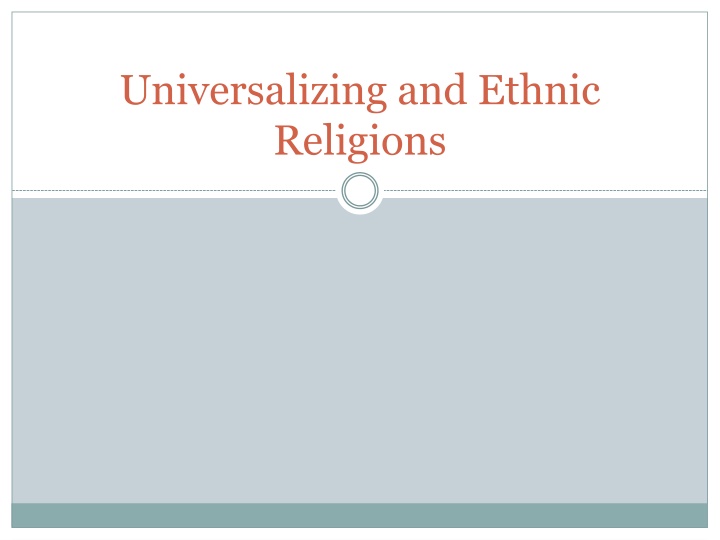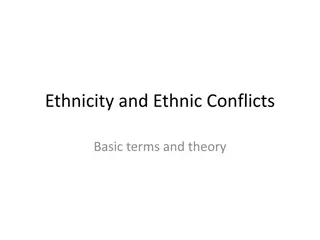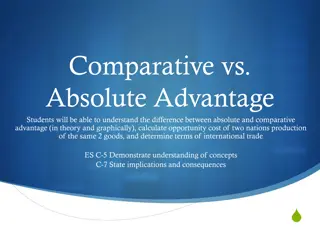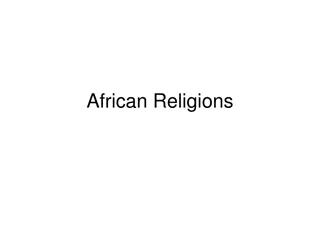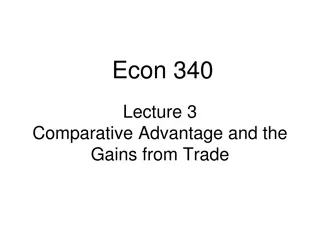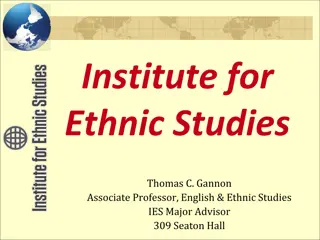A Comparative Study of Universalizing and Ethnic Religions
Understanding the differences between universalizing and ethnic religions, the main tenets of Christianity, Islam, Buddhism, and Hinduism, along with their geographic distribution. Explore the concepts of universalizing vs. ethnic religions and the branches within them.
Download Presentation

Please find below an Image/Link to download the presentation.
The content on the website is provided AS IS for your information and personal use only. It may not be sold, licensed, or shared on other websites without obtaining consent from the author.If you encounter any issues during the download, it is possible that the publisher has removed the file from their server.
You are allowed to download the files provided on this website for personal or commercial use, subject to the condition that they are used lawfully. All files are the property of their respective owners.
The content on the website is provided AS IS for your information and personal use only. It may not be sold, licensed, or shared on other websites without obtaining consent from the author.
E N D
Presentation Transcript
Universalizing and Ethnic Religions
Objectives Today we will be able to identify the differences between universalizing and ethnic religions, the basic tenets of the three main universalizing religions of Christianity, Islam and Buddhism, and the ethnic religion of Hinduism, as well as the geographic distribution of these religions.
Universalizing vs. Ethnic Religions Universalizing Religion A religion that attempts to be global, to appeal to all people, wherever they live in the world, not just those of one culture or location. Ethnic Religion A religion that appeals primarily to one group of people living in one place. 58 percent of the world practice a universalizing religion 26 percent practice an ethnic religion 16 percent practice no religion
Universalizing Religions The three main universalizing religions in the world are Buddhism, Christianity and Islam They are all divided into branches and sects Branch a large and fundamental division within a religion Christianity Roman Catholicism, Protestant, Orthodox Islam Sunni, Shiite Denomination A division of a branch Protestant Presbytirianism, Lutheran, Baptist Sect A relatively small group that has broken away from an established denomination Christian Maronites in Lebanon
Christianity More than 2 billion adherents with the most widespread distribution Three main branches Roman Catholic, Protestant, and Orthodox RC 51% of Christians, Protestants 24%, Orthodox 11%, Other 11% Geographic Considerations RC Dominant Christian branch in SW and part of Eastern Europe Protestantism Dominant in northwest Europe Orthodox Eastern Europe and the Middle East In Western Hemisphere 90 percent Christian RC 93% of Christians in Latin America, 40% of Christians in N. America In N. America, RC clustered in northeast and southwest Protestantism 28% of US population over 5
Tenets of Christianity Christians believe in a God who is omnipresent. Jesus Christ is the son of God Christians also believe that Jesus brings God s forgiveness of sin to humanity. Doctrine of the Trinity - God is one being who is revealed to human beings in three ways: Father, Son (Jesus), and Spirit
Islam 1.3 billion people practice Islam around the world Two main branches of Islam Sunni 83% of Muslims and largest branch in most countries in the Middle East and Asia The word Sunni is derived from the Arabic word for people following the example of Muhhammad Shiite 16% of Muslims and clustered in a few countries: Iran (30% of Shiites), Pakistan (15% of Shiites), and Iraq (10% of Shiites). The word Shiite is derived from the Arabic word for sectarian Geographic considerations The predominant religion of the Middle East from North Africa to Central Asia. Half of Muslims live in 4 countries Indonesia, Pakistan, Bangladesh, and India. Between 1 and 5 million Muslims live in N. America Muslims account for 5% of the European population France largest population with 4 million Immigrants from former colonies in N. Africa. Germany 3 million Immigrants from Turkey. In Southeast Europe Albania, Bosnia and Serbia have 2 million each.
Tenets of Islam The Five Pillars of Faith There is no god worthy of worship except the on God, the source of all creation, and Muhammad is the messenger of God Five times daily, a Muslim prays, facing the city of Makkah (Mecca), as a direct link to God. A Muslim gives generously to charity as an act of purification and growth A Muslim fasts during the month of Ramadan as an act of self-purification If physically and financially able, a Muslim makes a pilgrimage to Makkah. 1. 2. 3. 4. 5.
Buddhism Nearly 400 million adherents mainly in China and Southeast Asia Three main branches of Buddhism Mahayanna 56% of Buddhists in China, Japan, and Korea Theravadists 38% of Buddhists in Cambodia, Laos, Myanmar, Sri Lanka, and Thailand Tentrayanists 6% of Buddhists in Tibet and Mongolia * An accurate count of Buddhists is challenging because only a few participate in Buddhist institutions. * Buddhism is not an exclusive religion Many practice an ethnic religion along with Buddhism.
Tenets of Buddhism The Four Noble Truths All living beings must endure suffering Suffering, which is caused by a desire to live, leads to reincarnation (repeated rebirth in new bodies or forms of life). The goal of all existence is to escape from suffering and the endless cycle of reincarnation into Nirvana )a state of complete redemption), which is achieved through mental and moral self- purification. Nirvana is attained through an Eightfold Path, which includes rightness of belief, resolve, speech, action, livelihood, effort, thought and meditation.
Ethnic Religions Ethnic religions are much more clustered in distribution than universalizing religions Hinduism largest ethnic religion with 900 million adherents and the world s third largest religion behind Christianity and Islam. 97% of Hindus live in India, the rest in Nepal Hindus believe that there are multiple paths to reach god and ways to worship and there is no central book. Paths of knowledge, renunciation, devotion, and action Branches of Hinduism Vaishnavism (70% of Hindus), Sivaism (26%), Shaktism (remainder) Other ethnic religions Confucianism, Daoism (Taoism), Shintoism, Judaism. Research basic tenets of these ethnic religions and be prepared to discuss.
